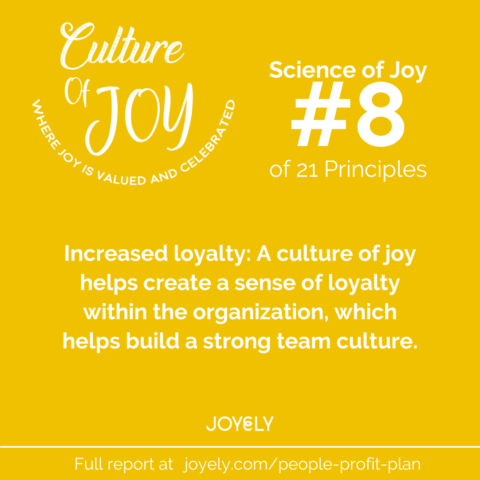To demonstrate how a culture of joy can lead to increased loyalty for companies in 2023, research from neuroscience and psychology can be used to explain the impact of positive emotions on decisions. For example, a study by Fredrickson et al. (2008) found that when people experienced positive emotions, they were more likely to cooperate with others and make decisions that would benefit the group as a whole. Seligman et al. (2006) also found that employees that have cultivated a culture of joy are more likely to make decisions based on a longer-term perspective, rather than a short-term one. This is because positive emotions activate the prefrontal cortex, which is associated with goal-oriented decision-making and long-term problem-solving (Gable & Harmon-Jones, 2008). This suggests that when employees experience positive emotions at work, they are more likely to make decisions that are beneficial to their company in the long run, such as staying loyal to their employers and maintaining a higher level of performance (Gable & Harmon-Jones, 2008).


In addition, research by Isen (2001) demonstrated that when people experience positive emotions, they are more likely to show an increased level of trust. This suggests that when employees feel joyful at work, they are more likely to trust their employer, leading to higher levels of loyalty (Isen, 2001).
Finally, research by Fredrickson et al. (2008) also found that when people experience positive emotions, their level of self-efficacy increases. This suggests that when employees feel joyful at work, they are more likely to feel confident and capable, which can lead to an increased level of loyalty to the company.
What we do at JOYELY in our corporate programs offers products and services that promote joy in the workplace. The Culture of Joy programs offer team-building activities, wellness programs, and training sessions on work-life integration. We make sure all interactions are engaging, interactive, fun, and relatable, as well as easy and simple to understand.
JOYELY’s Chair of Joy Experience and specialized joy-enhancing techniques help increase productivity and build upon profitability strategies while decreasing turnover. We do all this while creating a healthier and more successful business.
Each company we work with is unique! At JOYELY, we consider the needs and values of each corporation we decide to work with. For example, we pay particular attention to the company mission and make sure there is an alignment of our approach and joy with the company’s mission or values.
Overall, we clearly communicate with corporations the extreme value of joy and the powerful science that backs a Culture of Joy. Our own unique research is outlined in the article, 21 Science-Based Reasons Why a Culture of JOY Is the Most Important Decision Your Company Can Make in 2023 will begin to create great results quickly.
We offer a 1–2-hour complimentary COJ Experience to select companies as an example of the Year of Joy Corporate Program.
Simply reach out to our JOYELY Team at www.joyely.com or you are welcome to connect with our founder, Sheryl Lynn at 949-303-5219 or sheryl@joyely.com
It’s time to immerse ourselves completely in the conversation of joy, to prioritize it above most things.. There’s no time to wait; it’s a matter of life and death.
Your Answer Matters!


We invite you to share your valuable experience. Your feedback not only guides future guests but also illuminates our path towards excellence. Please take a moment to leave a review and help shape our journey forward.



Welcome to JOYELY, where JOYELY Ever After is not just a dream, it’s our lifestyle.
© 2024 JOYELY. All Rights Reserved.